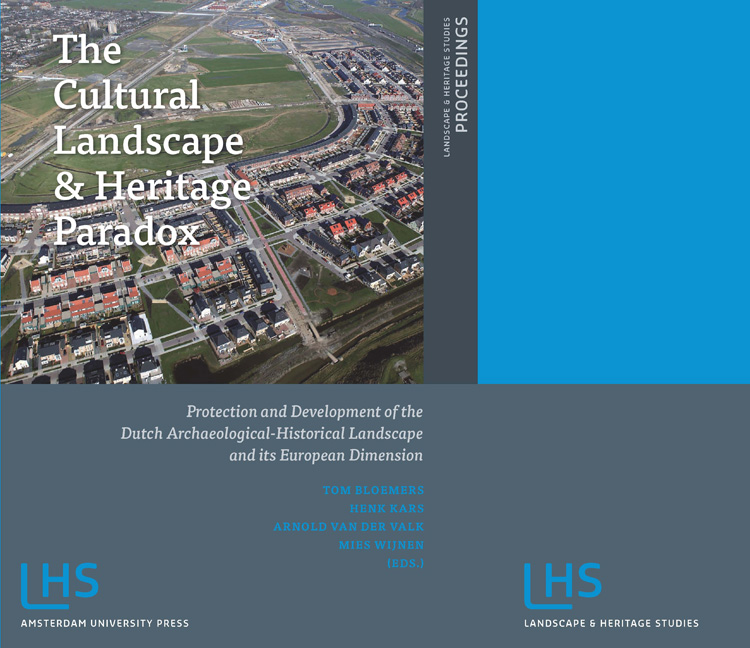 The Cultural Landscape and Heritage Paradox
The Cultural Landscape and Heritage Paradox Book contents
- Frontmatter
- Contents
- Preface
- I INTRODUCTION
- II INSIGHTS AND PROSPECTS OF ARCHAEOLOGICAL-HISTORICAL LANDSCAPE STUDIES
- III LINKING KNOWLEDGE AND ACTION
- IV IMAGINATION - FACTS AND CONSTRUCTIONS
- V SHARING KNOWLEDGE - STORIES, MAPS AND DESIGN
- VI SYNTHESIS AND CONCLUSIONS
- VII MANAGEMENT OF KNOWLEDGE
- VIII AGENDA FOR THE FUTURE
- IX SUMMARY
- X APPENDIX
- Subject Index
- Index of Places and Regions
7 - On the Necessity of Congruent Meanings in Archaeological Heritage Management. An Analysis of three case Studies from a Policy Science Perspective
Published online by Cambridge University Press: 21 January 2021
- Frontmatter
- Contents
- Preface
- I INTRODUCTION
- II INSIGHTS AND PROSPECTS OF ARCHAEOLOGICAL-HISTORICAL LANDSCAPE STUDIES
- III LINKING KNOWLEDGE AND ACTION
- IV IMAGINATION - FACTS AND CONSTRUCTIONS
- V SHARING KNOWLEDGE - STORIES, MAPS AND DESIGN
- VI SYNTHESIS AND CONCLUSIONS
- VII MANAGEMENT OF KNOWLEDGE
- VIII AGENDA FOR THE FUTURE
- IX SUMMARY
- X APPENDIX
- Subject Index
- Index of Places and Regions
Summary
ABSTRACT
In this paper I discuss the debate between local authorities, planners and developers on the one hand and archaeologists on the other. The focus is on three cases in the Dutch river landscape, the Betuwe, where the municipalities are planning new housing and archaeologists want to preserve selected sites deemed important.
I try to explain the conflicts that arise and their consequences by taking an interpretive stance using concepts such as frame of meaning, levels of judgement, shared meanings and congruent meanings.
The argument I will develop is that if archaeologists seriously want to integrate archaeological sites in the public space in a successful and significant way, they should acknowledge the necessity of congruent meanings of the archaeological record. The examples used show how the archaeologist can employ the theoretical concept of congruent meanings to engage in the practice of planning processes in a more fruitful way.
I conclude that although congruent meanings of the archaeological record appeared to arise on several occasions, this did not result in a shared solution because different actors did not attempt to understand the motivations of the others.
KEYWORDS
Planning, archaeological record, heritage management, congruent meanings, frame of meaning, Valletta Convention
INTRODUCTION
It will be no surprise that in a densely populated country like the Netherlands conflicts over land use arise on many occasions. In this paper I will deal with a specific type of conflict, cases where new housing is planned on top of a site that is also (highly) valuable from an archaeological point of view. Theoretically speaking, an integration of both interests is quite possible, and moreover the 1992 Valletta Convention (Valletta 1992) expressly asks for such an integration. In practice, however, the parties involved find it very difficult and consequently very often do not succeed in attaining such a meaningful integration.
I will try to explain why this is so difficult and will do so in such a way that my explanation points at a pattern of thinking to handle these types of conflicts. My explanation will rely on literature from the policy sciences, especially the work of Donald Schön (Schön 1983), Frank Fischer (Fischer 1995) and John Grin and Henk van de Graaf (Grin/Van de Graaf 1996; Van de Graaf/Grin 2001).
- Type
- Chapter
- Information
- The Cultural Landscape and Heritage ParadoxProtection and Development of the Dutch Archaeological-Historical Landscape and its European Dimension, pp. 461 - 476Publisher: Amsterdam University PressPrint publication year: 2010


